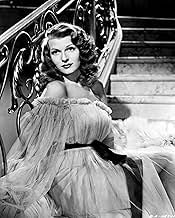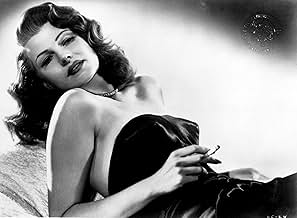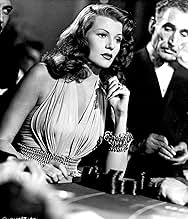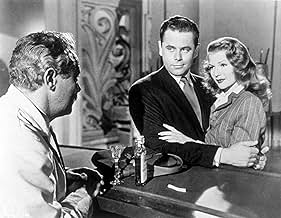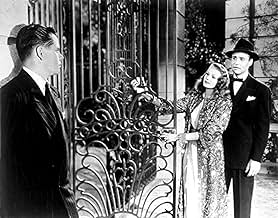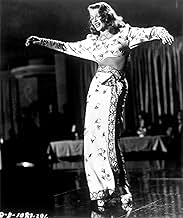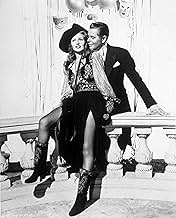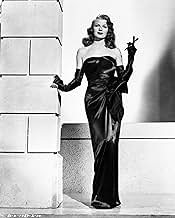Ein Gelegenheitsspieler, der eine Anstellung in einem Casino in Buenos Aires erhält, entdeckt, dass die neue Frau seines Chefs seine Ex-Geliebte ist.Ein Gelegenheitsspieler, der eine Anstellung in einem Casino in Buenos Aires erhält, entdeckt, dass die neue Frau seines Chefs seine Ex-Geliebte ist.Ein Gelegenheitsspieler, der eine Anstellung in einem Casino in Buenos Aires erhält, entdeckt, dass die neue Frau seines Chefs seine Ex-Geliebte ist.
- Auszeichnungen
- 4 Gewinne & 1 Nominierung insgesamt
- Gabe Evans
- (as Robert Scott)
- Thomas Langford
- (as Don Douglas)
- Newsman
- (Nicht genannt)
- …
- Gambler
- (Nicht genannt)
- Nightclub Patron
- (Nicht genannt)
- Blackjack Dealer
- (Nicht genannt)
- Girl at Carnival
- (Nicht genannt)
- Gambler
- (Nicht genannt)
- American Cartel Member
- (Nicht genannt)
Empfohlene Bewertungen
By the way, it is rather fascinating to see that in many ways this film mirrored the real-life antics of Rita--especially in regard to how she had a devil of a time picking men! Both Gilda and Rita both seemed to have a lot of sex destructiveness within them.
Hayworth is gorgeous and so is Ford. They are so good together and in this movie they are positively great. When great screen lovers are mentioned, I've often wondered why Ford and Hayworth aren't among them.
This is one of my absolute favorites.
"Gilda" is the film that made Rita Hayworth a star, and (with "Paths of Glory") gave Macready his justifiable claims to being one of Hollywood's best villains. Ironically many people don't think of Macready as anything but a villain in movies. It is true that in films like "Lady Without a Passport" and "The Big Clock" he was a villain, but he also could play decent people. He tries to help Spencer Tracy escape recapture and execution in "The Seventh Cross", and he is the wise minister and reformer who helps thwart Ray Milland (a.k.a. the Devil) in "Alias Nick Beal". But his Balin is pure, malevolent ice. There has been some suggestion that Balin's relationship with Johnny is actually a homosexual one (the business with the knife in the cane possibly being a metaphor for a male sex organ). Perhaps, but it is a weird friendship of two cynics who (briefly) enjoy each other's cynicism.
Curiously enough the business of the tungsten cartel is rarely discussed in going over the film. Like "Notorious" which came out about the same time, "Gilda" reminded American audiences of the large numbers of Nazis and collaborators who fled to South America in this period. In "Notorious" it was Brazil, and the gang (led by Alex Sebastian - Claude Rains) was fooling around with uranium. Here the idea of such people controlling a useful metal's manufacturing was not probed as much, probably because Balin was set to double cross them. But it is worrying to think of them coming so close to it.
In a discussion of the Warner Baxter film, "Such Men Are Dangerous" I mentioned that (like that film) there is a hint here of the 1928 mysterious death of millionaire Alfred Loewenstein, who managed to fall out of his private airplane over the English Channel. Here, to evade both the Nazis and Calleia, Balin arranges his plane to explode over the ocean (although the audience and Calleia see a figure parachute before it does so). Not quite the same problem as the Loewenstein mystery, but one can see the seed of the idea was there.
I would say this was certainly one of the better film noirs. It even was somewhat thought provoking.
Our story unfolds in Buenos Aires. Which as you watch the movie is easy to forget because there is absolutely no South American flavor to the proceedings. The story might as well be set in Milwaukee. Anyhow small-time gambler and successful cheater Johnny Farrell somehow finds himself running a high-class casino after the casino's owner, Ballin Mundson, takes a liking to him. Everything is going swimmingly until one day, completely out of the blue, Ballin returns home from a trip with a beautiful new wife in tow. This woman is going to cause all kinds of complications. This woman of course is Gilda and right from the start, from her first memorable moment on the screen, Hayworth takes hold of the movie. Gilda's a fascinating character with so much lurking under the surface. And what's on the surface ain't so bad either. Not for nothing was Hayworth the era's most popular pinup girl. A shame then that the movie can't take full advantage of the allure and talents of its star.
Hayworth is vibrant, exciting, bursting with life. The movie is not. In playing Johnny Farrell, the character we unfortunately spend more time with than we do with Gilda, Glenn Ford comes across as being somewhat dull. And his character is rather unlikable. The story contains some elements which fall flat. There's something about a tungsten cartel which involves some angry Germans. This of course has nothing to do with Gilda. Can we just get back to Gilda? Please? Somewhere along the way the story really gets bogged down and not even Hayworth can fully rescue it. Everyone will remember Hayworth's big moments. She makes quite the impression with her famous singing and dancing. Well dancing anyway as the singing voice isn't hers. But nevertheless that famous number, "Put the Blame on Mame", is quite the spectacle. Now who to put the blame on for surrounding the fabulous Hayworth with an otherwise very ordinary movie? You'll love Rita. Love the movie? That's a stretch.
Wusstest du schon
- WissenswertesThere is a rumour that this film is the only time Rita Hayworth's real singing voice is heard, but that is not true. According to the bonus features from the DVD, Hayworth actually never recorded her own singing voice and was a talented lip-syncher. Anita Ellis dubbed almost all of her singing in this film. Hayworth always wanted to do her own singing, and Columbia Pictures chief Harry Cohn paid for her voice lessons, but she never developed a voice he considered strong enough to be used; Hayworth remained bitter about that for the rest of her life.
- PatzerWhen Farrell asks to cut the deck at the blackjack table, he shuffles the deck prior to the cut; this is not allowed.
- Zitate
Gilda: You do hate me, don't you, Johnny?
Johnny Farrell: I don't think you have any idea of how much.
Gilda: Hate is a very exciting emotion. Haven't you noticed? Very exciting. I hate you too, Johnny. I hate you so much I think I'm going to die from it. Darling...
[they kiss passionately]
Gilda: I think I'm going to die from it.
- VerbindungenEdited into Head (1968)
Top-Auswahl
- How long is Gilda?Powered by Alexa
Details
Box Office
- Weltweiter Bruttoertrag
- 5.999 $
- Laufzeit1 Stunde 50 Minuten
- Farbe
- Seitenverhältnis
- 1.37 : 1
Zu dieser Seite beitragen



